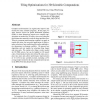396 search results - page 4 / 80 » How scientific models can explain |
VSTTE
2005
Springer
13 years 10 months ago
2005
Springer
We formulate some research and development challenges that relate what a verifying compiler can verify to the definition and analysis of the application-content of programs, where...
PARELEC
2006
IEEE
13 years 11 months ago
2006
IEEE
High performance computing in heterogeneous environments is a dynamically developing area. A number of highly efficient heterogeneous parallel algorithms have been designed over l...
EUSFLAT
2009
13 years 3 months ago
2009
The age at which we teach different topics change. If it turns out that students do not learn, say, reading by the time they should, a natural idea is to start teaching them earlie...
ACL
2008
13 years 6 months ago
2008
In this paper, we present a study of a novel summarization problem, i.e., summarizing the impact of a scientific publication. Given a paper and its citation context, we study how ...
SC
2000
ACM
13 years 8 months ago
2000
ACM
Compiler transformations can significantly improve data locality for many scientific programs. In this paper, we show iterative solvers for partial differential equations (PDEs) i...

